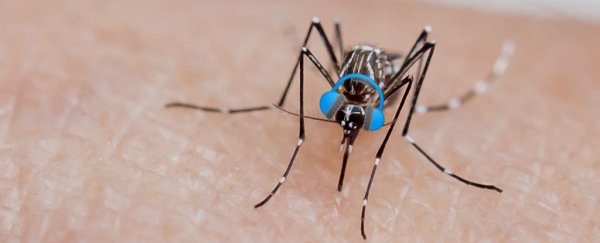When it comes to protecting yourself from mosquitoes at your next garden party, there might be one deterrent you're not thinking of – blasting Skrillex's Scary Monsters and Nice Spirits at full volume all night.
You might annoy everyone present, but according to researchers in Malaysia and Thailand, it works as a bizarre form of annoyance for dengue-carrying mosquitoes.
"Although sound has been reported to play an important role in the sexual interactions and survival of many insects, including mosquitoes, there is evidence that sound has detrimental effects on insect acoustic signal perception, courtship, and feeding activities," the researchers explain.
"The present study was performed to examine whether electronic music influences the foraging activity, blood feeding and mating successes of the dengue vector, Aedes aegypti."
If you haven't listened to Scary Monsters and Nice Sprites, you're in for a treat. Released in 2010, it's a mix of samples, noise, and bass drops that epitomises the dubstep music genre of that era.
It's also not hard to see how the mosquitoes were put off their groove.

The team studied hundreds of mosquitoes (Aedes aegypti), investigating how long it took for them to copulate, as well as the time it took to feed on a poor hamster - who probably suffered quite a few itchy mosquito bites in the name of science.
The researchers found that it took significantly longer for female mosquitoes to feed; they also fed less, and had much less sex when the dubstep hit was playing, compared to times when no music was playing at all.
"The observation that such music can delay host attack, reduce blood feeding, and disrupt mating provides new avenues for the development of music-based personal protective and control measures against Aedes borne diseases," explain the researchers.
Okay, we know what you're thinking – yes, this research seems a bit silly, but it's actually one paper in a surprisingly large body of research into the effects music can exert on insects.
For instance, that annoying buzz of mosquitoes, next to your ear, in the middle of the night? They use that as a mating signal. The tone of the female is 400 Hz and the male is 600 Hz - they get frisky by sharing a tone at 1200 Hz.
Mucking up the insects' ability to hear these tones can change mating and feeding behaviours, which could have an impact on how mosquitoes interact with humans and spread diseases.
It's not just mosquitoes, either. For bugs we do want around - for example, pollinators - some types of music or ambient noise such as traffic could actually be damaging their populations.
"When exposed to music by AC/DC, who articulated the null hypothesis that 'rock and roll ain't noise pollution' in a song of the same name, lady beetles were less effective predators, resulting in higher aphid density and reduced final plant biomass relative to control (no music) treatments," a different team of researchers explained in a paper published last year.
So although these sorts of lighthearted studies come across as entertaining, the research is important.
With many insect populations currently appearing to be in decline in many parts of the world, and mosquito borne infection rates likely to be affected by climate change, we need all the information we can gather on helping - or deterring - the bugs we share the planet with.
The research has been published in Acta Tropica.
